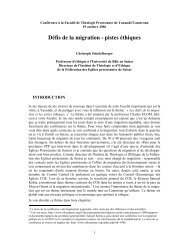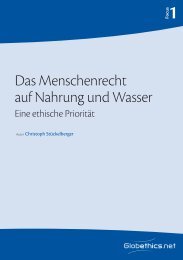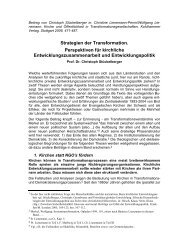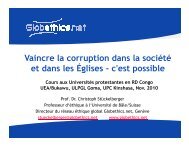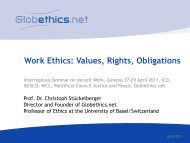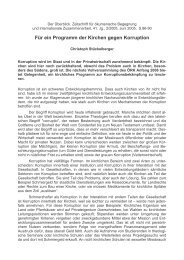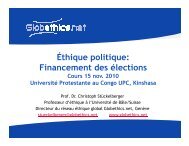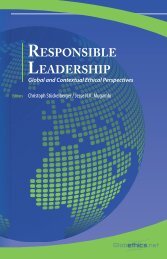BREAK THE CHAINS OF OPPRESION AND THE YOKE OF ...
BREAK THE CHAINS OF OPPRESION AND THE YOKE OF ...
BREAK THE CHAINS OF OPPRESION AND THE YOKE OF ...
Create successful ePaper yourself
Turn your PDF publications into a flip-book with our unique Google optimized e-Paper software.
FuturE particular role in relation to other creatures. 20 Our dominion should therefore be<br />
exercised in a way that it images and reflects God’s care for creation. This kind of<br />
care, made more explicit in the instruction to Adam to till and keep the soil of<br />
Eden (Gen. 2.15), has often been described as ‘stewardship’ of creation, rooted<br />
in the image of a person placed in a position of responsibility to manage somebody<br />
else’s property, finances, or household. 21 This picture of a human role on<br />
behalf of the rest of creation can help us recognize our responsibility to care for<br />
other life, although it is important to recognize its limitations. God is present<br />
and active in sustaining creation from moment to moment. We are not, therefore,<br />
stewards acting in place of an absent landlord, but servants called to play<br />
our part in response to God’s care for creation. This responsibility has obvious<br />
relevance to climate change, suggesting that the potential mass extinctions of<br />
other species on the planet caused by human activities represent our abdication<br />
from a divinely-entrusted duty. Biblical texts testifying to God’s concern for<br />
creatures beyond the human, together with Israelite law defending them, demand<br />
that we should be motivated by love and justice to protect nonhuman<br />
neighbours threatened by climate change alongside the human ones.<br />
Reflection 6<br />
Look up the Bible texts from this section.<br />
● In what ways do animals and nature contribute to your life?<br />
● In what ways can you exercise<br />
Bringing God’s judgement upon us<br />
Alongside hope in the future that God is bringing, therefore, comes an urgency<br />
to cooperate with �God’s �purposes. � Where human �beings � have wilfully neglected<br />
their responsibilities before God, both Old and New Testament texts proclaim<br />
God’s judgement: Jeremiah prophesies that the rich will not get to enjoy their<br />
wealth and Jesus warns those who fail to care for him, embodied in those in<br />
need, are not fit for eternal life. The Bible repeatedly tells of a world turned upside-down<br />
when God’s reign is inaugurated, with those now well-off going hun-<br />
20 See, for example, Gordon J. Wenham, Genesis, Word Bible Commentary (Waco:<br />
Word, 1994), 30; Victor P. Hamilton, Genesis, Nicot (Grand Rapids: Eerdmans,<br />
1995), 135; Walter Brueggemann, Genesis (Louisville: John Knox Press, 1982), 32;<br />
von Rad, Genesis, 58 and the detailed discussion in J. Richard Middleton, The Liberating<br />
Image: The Imago Dei in Genesis 1 (Grand Rapids, MI: Brazos, 2005), 93–145.<br />
21 Calvin’s commentary on Gen. 2.15 concludes ‘let every one regard himself as the steward<br />
of God in all things which he possesses. Then he will neither conduct himself dissolutely,<br />
nor corrupt by abuse those things which God requires to be preserved.’ (John<br />
Calvin, Genesis, ed. & trans. John King (Edinburgh: Banner of Truth Trust, 1965),<br />
vol. 1, 125.<br />
������������������������������������������������<br />
� � � � ������������������������<br />
�<br />
158<br />
– Hope in God’s Future –



